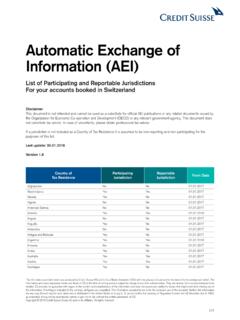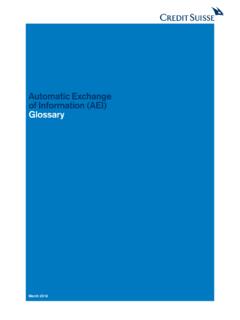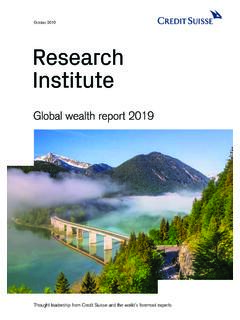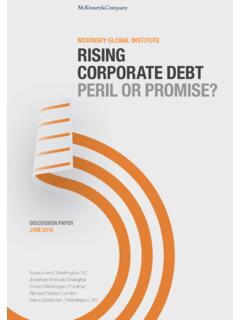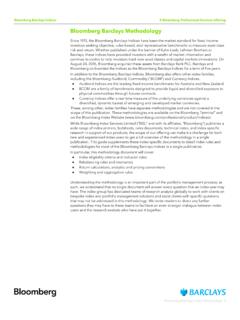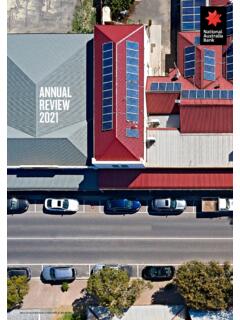Transcription of June 2021 Research Institute - Credit Suisse
1 Research Institute Thought leadership from Credit Suisse and the world s foremost expertsJune 2021 Global wealth report 2021 2 Introduction Now in its twelfth year, I am proud to present to you the 2021 edition of the Credit Suisse Global Wealth Report. This report delivers a comprehensive analysis on available global household wealth, underpinned by unique insights from leading academics in the field, Anthony Shorrocks and James Davies. This year s edition digs deeper into the impact of the COVID-19 pandemic and the response of policymakers on global wealth and its distribution. Mindful of the important wealth differences that have built over the last year, our report also offers perspectives and, indeed, encouraging prospects.
2 For wealth accumulation throughout the global wealth pyramid as we look to a world beyond the hope you find the insights of this edition of the Global Wealth Report to be of particular value in what remain unprecedented nio Horta-Os rioChairman of the Board of DirectorsCredit Suisse Group AGGlobal wealth report 2021302 Editorial05 Global wealth levels 202017 Global wealth distribution 202027 Wealth outlook for 2020 2535 Country experiences 36 Canada and the United States 38 China and India 40 France and the United Kingdom 42 Germany, Austria and Switzerland 44 Denmark, Finland, Norway and Sweden 46 Japan, Korea, Singapore and Taiwan (Chinese Taipei) 48 Australia and new zealand 50 Nigeria and South Africa 52 Brazil, Chile and Mexico 54 Greece, Italy and Spain56 About the authors 57 General disclaimer / important informationFor more information, contact:Richard Kersley Head Global Thematic Research , Global MarketsCredit Suisse Hechler-Fayd herbe Chief Investment Officer International Wealth Management and Global Head of Economics & ResearchCredit Suisse AG Suisse Research Institute photo: Getty Images, Onfokus.
3 Photo right: Getty Images, Niccolo Guasti4 Photo: GettyImages, Steve StrikeGlobal wealth report 20215 Global wealth levels 2020 Uncertain timesThe short-term consequences of the COVID-19 pandemic for household wealth are now much clearer than they were last summer. They confound expectations. The widespread negative impact on gross domestic product (GDP) was recognized early in 2020, and since reductions in the level of economic activity are typically associated with reductions in household wealth, financial markets responded in a predictable way and share prices dived in February and March.
4 No region was immune. By the second half of March, the S&P 500 had fallen by 34%, the FTSE100 by 35%, the DAX by 39%, and the Nikkei by 31%. China was more resilient, but this did not prevent the Shanghai index from also falling, albeit by a more modest 13%. As a result, we estimate that USD trillion was lost from total global household wealth between January and March 2020, equivalent to a fall of Global wealth per adult declined by by the prompt action of governments and central banks, financial markets regained confidence and the losses in equity markets were largely reversed by the end of June.
5 That much Anthony Shorrocks, James Davies and Rodrigo Lluberaswas understandable. But what happened in the second half of 2020 was unforeseen. Share prices continued on an upward path, reaching record levels by the end of the year. After initially pausing to take stock, housing markets were also infected by the prevailing optimism, and house prices rose at rates not seen for many years. These asset price increases have led to major gains in household wealth throughout the world. The net result was that USD trillion was added to global household wealth during the year. At the end of 2020, it totaled USD trillion, up Wealth per adult rose to a new record high of USD 79,952.
6 Depreciation of the US dollar flatters these gains: adjusting for exchange rate changes, total wealth would have risen by and wealth per adult by Nevertheless, bearing in mind the widespread economic disruption, household wealth and macroeconomic indicators seem to be on different trajectories. Stranger still, countries most affected by the COVID-19 pandemic have often been those recording the greatest gains in wealth per adult. The contrast between what has happened to household wealth and what is happening in the wider economy can never have been more in its twelfth edition, the Credit Suisse Global Wealth Report is the most comprehensive and up-to-date source of information on global household wealth.
7 Wealth creation in 2020 was largely immune to the challenges facing the world due to the actions taken by governments and central banks to mitigate the economic impact of COVID-19. Total global wealth grew by and wealth per adult rose by 6% to reach another record high of USD 79,952. Overall, the countries most affected by the pandemic have not fared worse in terms of wealth creation. 6We believe the core reasons for this disconnect are clear. Many governments and central banks in more advanced economies, anxious to avoid the mistakes made during the global financial crisis, have taken pre-emptive action in two primary ways: first, by organizing massive income transfer programs to support the individuals and businesses most adversely affected by the pandemic, and second, by lowering interest rates often to levels close to zero and making it clear that interest rates will stay low for some time.
8 The lowering of interest rates by central banks has probably had the greatest impactThere is little doubt that these interventions have been highly successful in meeting their immediate objectives. However, they have come at a great cost. Public debt relative to GDP has risen throughout the world by 20 percentage points or more in many countries. In essence, there has been a huge transfer from the public sector to the household sector, which is one of the reasons why household wealth has been so resilient. In one respect, these transfers overcompensated households. Generous payments have meant that disposable household income has been relatively stable and has even risen in some countries.
9 In combination with restricted consumption opportunities, this has led to a surge in household saving, which has inflated household financial assets and caused household debts to be lower than they would be otherwise. This increase in savings was an important source of household wealth growth last lowering of interest rates by central banks has probably had the greatest impact. It is a major reason why share prices and house prices have flourished, and these translate directly into our valuations of household wealth. Lower interest rates also seem to be a cost-free option, except perhaps to those relying on interest payments to supplement their income.
10 Lower interest rates have no direct impact on public expenditure and coordinated action by central banks can even reduce expenditure via reduced public debt interest. There are inflation implications in the longer run and also questions related to future rises in interest rates. However, these are relatively unimportant compared to the more immediate economic in wealth per adultFigure 1 places the performance of household wealth in 2020 in the context of annual wealth growth since the turn of the century. Smoothed exchange rates are used for this series in order to minimize year-on-year fluctuations due to short-term changes in exchange rates.


